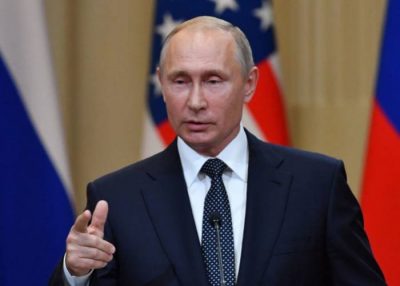Russian government resigns as Vladimir Putin plans future
If approved by the public, the proposals would transfer power from the presidency to parliament.
Mr Putin is due to step down in 2024 when his fourth term of office comes to an end.
But there is speculation he could seek a new role or hold on to power behind the scenes.
Mr Putin put forward his plans in his annual state of the nation address to lawmakers. Later, in an unexpected move, Prime Minister Dmitry Medvedev announced that the government was resigning to help facilitate the changes.
Russian government sources told the BBC that ministers did not know about the government’s resignation ahead of the announcement.
“It was a complete surprise,” one source said.
What is Mr Putin proposing?
Constitutional reforms included giving the lower house of parliament, the State Duma, “greater responsibility” for the appointment of the prime minister and the cabinet.
Other measures include:
Limiting the supremacy of international law
Amending the rules that limit presidents to two consecutive terms
Strengthening laws that prohibit presidential candidates who have held foreign citizenship or foreign residency permits
“These changes, when they are adopted… will introduce substantial changes not only to an entire range of articles of the constitution, but also to the entire balance of power, the power of the executive, the power of the legislature, the power of judiciary,” Mr Medvedev said of Mr Putin’s proposals.
“In this context… the government in its current form has resigned.”
Mr Putin thanked Mr Medvedev for his work but said “not everything” had been accomplished.
He asked Mr Medvedev to become deputy head of the National Security Council, which is chaired by Mr Putin.
The president later nominated tax service chief Mikhail Mishustin to replace Mr Medvedev as prime minister.
Mr Medvedev has been prime minister for several years. He previously served as president from 2008-2012, switching roles with Mr Putin – a close ally – after the latter served his first two terms as president. Russia’s constitution only allows presidents to serve two consecutive terms.
Even when he was prime minister, Mr Putin was widely seen as the power behind then President Medvedev.
Opposition leader and leading Kremlin critic Alexei Navalny said he believed that any referendum on the constitutional changes would be “fraudulent crap”. He said Mr Putin’s goal was to be “sole leader for life”.
The last time Russia held a referendum was in 1993 when it adopted the constitution under President Boris Yeltsin, Mr Putin’s predecessor.
Mr Putin became acting president following Mr Yeltsin’s resignation in 1999 and was formally inaugurated a year later. He has held the reins of power – as president or prime minister – ever since.
Part of Putin’s bigger plan?
President Putin likes stability. It’s his thing. So the newsflash that the entire government had resigned was a big surprise. From the online chatter, it seems even the cabinet ministers didn’t see it coming. For a moment it was like a flashback to Russia of the 1990s, when President Yeltsin changed prime ministers as readily as his socks. Vladimir Putin is no Yeltsin, though, and this move looks like part of some bigger plan that’s all about consolidating – and extending – his hold on power.
Under the current rules, Mr Putin must step down as president in 2024 and it’s never been clear what he’d do next. That’s still true. But the constitutional tweaks he’s proposed are hints at some options. He’s bumped up the status of the little-known State Council, which he already heads. Or he could become PM again, now he’s slightly weakened the powers of Russia’s president.
If he is sticking around, perhaps he needs to make that palatable to people given all the social and economic problems he had to list once again in his annual address to the nation. If Mr Putin were to blame for their woes, Russians might well wonder why they should swallow him staying on, post-2024. Dmitry Medvedev – so often useful to Mr Putin – for now looks like a handy scapegoat.
What else did Mr Putin say?
Last year Mr Putin promised tax breaks for bigger families.
On Wednesday he pledged state funding for new mothers in a bid to increase the number of children being born from an average of fewer than 1.5 per woman to 1.7 within four years.
So-called “maternity capital” has until now only been paid to families with at least two children.
Welfare benefits will also be paid for children aged three to seven in low-income families, and free school meals will be provided for the first four years of school.
Russia’s population has struggled to recover from a dramatic decline in the 1990s. (BBC)


